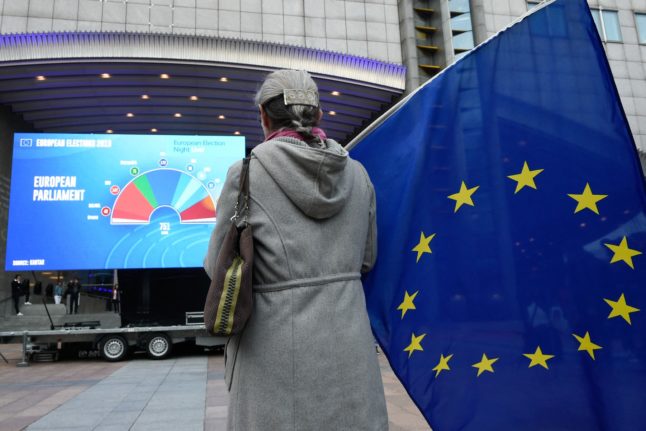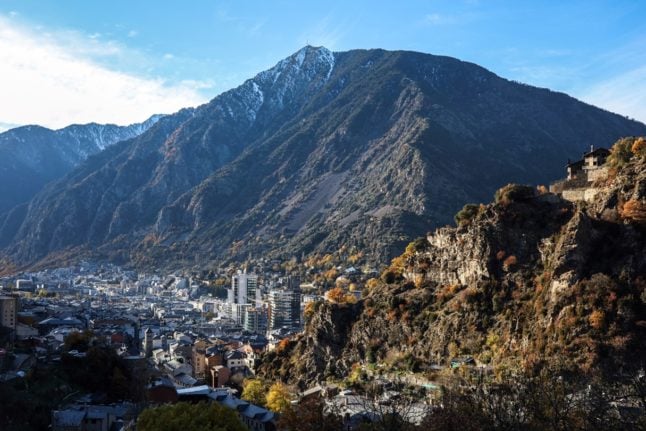How high the wave goes will largely depend on the response from traditional conservative and centre-right parties, outfits often balancing efforts to cling on to their electoral turf while trying to form workable governing coalitions.
In the past, far-right parties could be kept beyond the pale on two conditions: voters saw them as dangerous to democracy, and their election results remained relatively marginal at up to 15 percent, said Gilles Ivaldi of France’s Sciences Po university.
But with much of the far right moderating anti-EU and anti-migrant rhetoric, “it’s more difficult to maintain a quarantine when you have a party that people think is pretty much like the others,” he added.
Listen to the team from The Local discussing the European elections in the latest episode of the Talking France podcast – download here or listen on the link below
What’s more, such parties are scoring much higher at the ballot box than in past decades.
Their electoral performance has made Brothers of Italy chief Giorgia Meloni prime minister of Italy and propelled Geert Wilders’s PVV party to the threshold of power in the Netherlands.
Some regions of Spain and Germany appear ungovernable without inviting in the Vox or Alternative for Germany (AfD) parties, while Portugal’s Chega is poised to play kingmaker following Sunday’s national elections.
Such successes are founded on “the build-up of successive crises” generating “successive layers of resentment” at those in power since the last European Parliament election in 2019, Ivaldi said.
On top of the years-long fallout from the 2008 financial crash and the mid-2010s refugee crisis have come the coronavirus and the war in Ukraine “with all the social and economic ramifications… around purchasing power, economic crisis and insecurity,” he added.
Where in the past Europe’s major parties on the left and right battled for the centre ground, “there are now pockets of voters who reward being radical, mostly on the right,” said Ignacio Molina, an analyst at Spain’s Elcano Royal Institute.
Ivaldi pointed to a “paradox” that even as populations become more tolerant overall, voters are placing a higher political priority on issues like immigration “in the context of the crisis in the economy and purchasing power”.
When centre-right politicians respond, they often “take up the themes of the far right… legitimising their ideas. And as is often said, voters prefer the original to the copy”.
OPINION: European elections are more than a poll on Putin
In France, the National Rally crowed of an “ideological victory” as it backed a hardline immigration bill that centrist President Emmanuel Macron thrashed out with opposition conservatives and passed in January.
Riding high in the polls, the party hopes to install its figurehead Marine Le Pen in the Elysée palace following the 2027 presidential vote.
Radical parties’ advances have been crimped in places by lingering political taboos.
In Stockholm, the Sweden Democrats support the centre-right government in a confidence and supply arrangement – despite being the largest party on their side of the chamber as other parties excluded ruling with them during the 2022 election campaign.
Since Wilders’ November election victory in the Netherlands, his legacy of anti-Islam rhetoric and calls for a referendum on quitting the EU have dragged out coalition talks with prospective partners, including the centre-right VVD and the anti-corruption New Social Contract.
“Wilders forged an identity for himself as someone opposed to moderate compromises,” Molina said.
Striking deals with opponents is “difficult for him, as well as for others to accept him as a valid counterparty.”
Late on Wednesday, Wilders acknowledged that he did not have the support from other parties to himself move into the Catshuis – the prime minister’s official residence in The Hague.
Media reports suggest the talks could instead produce a technocratic government.
Gains for the far right at the June European Parliament election could tempt centre-right parties towards an alliance in Brussels, Ivaldi said.
“That would mean toughening up migration policy and above all going into reverse on climate” issues, given the radicals’ dislike of anti-emissions policies.
Further into the future, far-right progress in national elections could change the balance of power in the European Council – the other elected policymaking pillar in the EU.
“This is really the heart of European power,” Ivaldi said.
More far-right members alongside Meloni and Hungary’s Viktor Orban “would mean a huge number of blocking factors on major questions, immigration, the climate and of course support for Ukraine”.
And while far-right rhetoric on dismantling the EU itself has cooled, “I don’t think they’ve really changed their minds”.
But “they saw that their hardest eurosceptic positions weren’t acceptable to the population,” Ivaldi said.
Many – especially in the Identity and Democracy (ID) group – still hope for “a much more intergovernmental model, more like the former European Community than a European Union, bringing back national aims and interests”.



 Please whitelist us to continue reading.
Please whitelist us to continue reading.
Member comments